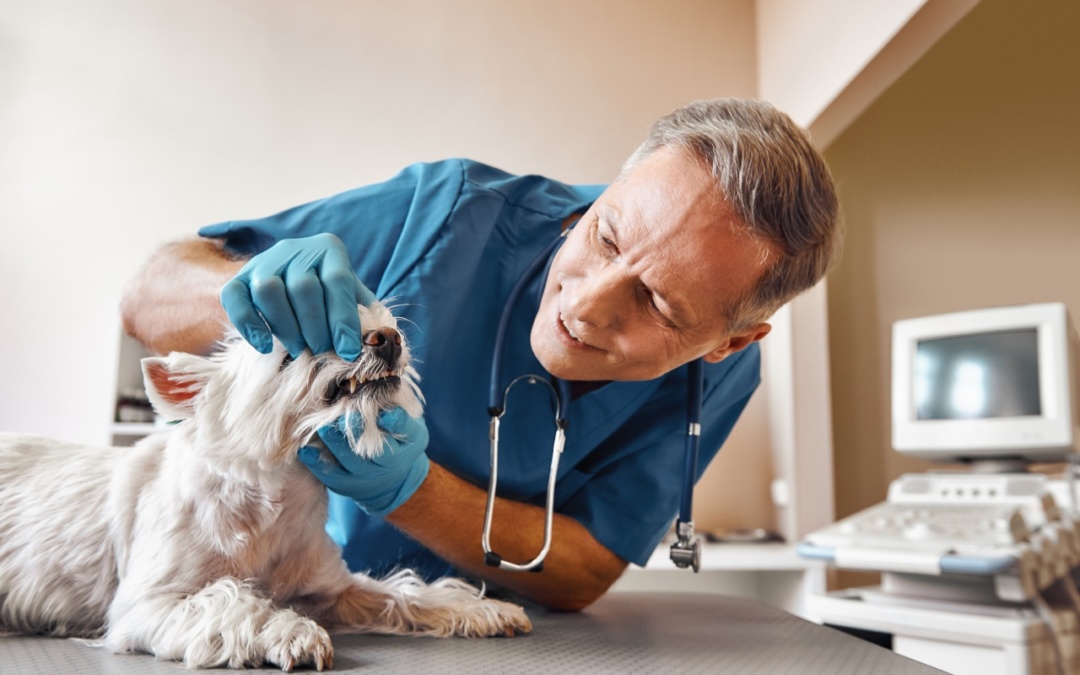February is National Pet Dental Health Month, created by the American Veterinary Medical Association to educate pet parents about the importance of taking good care of their pets’ teeth and mouths. Unfortunately, dental issues are quite common in dogs and cats. According to the American Veterinary Dental Society, by age three, 80% of dogs and 70% of cats will develop some stage of oral disease.
If your veterinarian detects your pet’s teeth are in the early stages of disease, treatment can be as simple as a cleaning. If left untreated, however, advanced periodontal disease can result in severe problems, ranging from tooth, gum, and bone loss to infections in the nasal passages and beyond. Studies in dogs have even shown that periodontal disease is associated with microscopic changes in the heart, liver, and kidneys.
The good news is, veterinary dentistry is extremely advanced, and there is a lot you and your veterinarian can do to ensure your pet’s mouth – and whole body – can stay healthy.
Brushing and Beyond
If daily toothbrushing isn’t part of your pet’s routine, it’s time to add it in. (Yes, cats too!) We know some people may balk at brushing their pet’s teeth, but many dogs and cats learn to tolerate it well, especially if treats are involved!
Professional dental cleanings by a veterinarian are also important to keep dental disease at bay. The cleanings are similar to your own –scaling and polishing the teeth to remove plaque and tartar, and taking X-rays to look below the gum line at the jaw and tooth roots. Unlike your own regular cleanings, though, your pet’s takes place under anesthesia.
Anesthesia eliminates any pain or stress that your pet may experience during a dental procedure, making it possible to successfully perform them with minimal discomfort. Because a thorough cleaning takes time, anesthesia enables the veterinarian to safely inspect or clean below the gum line (where most dental disease occurs) without the risk of your pet moving or causing injury to himself.
Anesthesia is also critical because sometimes during a cleaning your veterinarian might notice something that requires further examination, including:
- Abscesses or infected teeth
- Broken teeth and roots
- Periodontal disease
- Cysts or tumors in the mouth
Having a pet already anesthetized enables exploration of the problem without delay.
A Full Range of Veterinary Dental Care Is Available at BEVS
Fortunately, BEVS offers a wide range of advanced veterinary dental and oral surgical care. Root canal treatment can save dead, infected, or broken teeth that would otherwise require extraction. Orthodontic treatment can treat painful tooth alignment problems. Periodontal treatment can save teeth, or when that is not feasible, oral surgical extractions can be performed with expertise by our doctor, and growths or tumors in the mouth may require a veterinarian specially trained in oral surgery.
At BEVS, our dentistry and oral surgery department is led by Dr. Bill Kellner. With over 25 years of experience, Dr. Kellner has trained under several leading veterinary dental experts and works with an experienced team of veterinary technicians who will treat your pet with expertise and compassion.
To make a referral or schedule a consultation with BEVS’ veterinary dentistry department, please call us at 802-863-2387.

